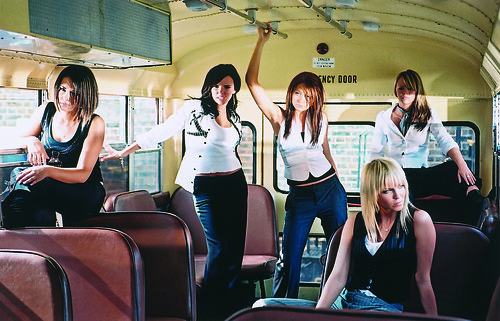Bumping in the back room
 I loved the new Girls Aloud track when I first heard a terrible quality radio rip. I was actually a little disappointed when I heard a proper quality version; it turns out my imagination had inserted a storming gay bassline (not that the real version doesn’t have a moderately storming bassline, though). Luckily, the promo comes with a full complement of generic dance remixes; of which I particularly like the sort-of-almost dubstep Co-stars mix. There’s a fine trance version, too, which plays the old trick of transposing the bass chord progression into the minor, making the vocals seem to float in some kind of noumenal heaven above the melancholy of the day-to-day world.
I loved the new Girls Aloud track when I first heard a terrible quality radio rip. I was actually a little disappointed when I heard a proper quality version; it turns out my imagination had inserted a storming gay bassline (not that the real version doesn’t have a moderately storming bassline, though). Luckily, the promo comes with a full complement of generic dance remixes; of which I particularly like the sort-of-almost dubstep Co-stars mix. There’s a fine trance version, too, which plays the old trick of transposing the bass chord progression into the minor, making the vocals seem to float in some kind of noumenal heaven above the melancholy of the day-to-day world.
Which reminds me of a number of interesting posts from &catherine, about a particular affective coldness in pop music. What interest me are those songs where apparent melancholy is somehow undercut precisely by the process of transforming emotion into music. The key example for me here is happy hardcore, which manages to preserve a sense of yearning like a specimen caught in amber, against a musical context that seems to expunge any possibility of emotion. I’m reminded of Spinoza’s claim that melancholy is always evil, but anguish can be good to the extent that it checks enthusiasm. Or, Nietzsche’s idea of a pessimism of strength: a cold pop music seems to begin from the essential painful nature of the world, but recognizes the worthlessness of raising this pain as a simple complaint. Instead (and I think happy hardcore is a particularly sharp example again here), there’s an odd combination of desperation and parody, an identification (over-identification?) with horror which works to create some kind of distance from it.